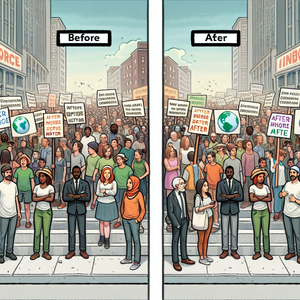The E-Commerce Evolution: How Bezos Revolutionized Online Shopping

Before Jeff Bezos launched Amazon in 1994, online shopping was largely considered a niche market. Many consumers were hesitant to trust the internet for their purchasing needs due to concerns about security and product quality. Recognizing this opportunity, Bezos initially focused on selling books—an ideal starting point due to the vast inventory available and the relatively low overhead costs compared to physical retail spaces. This strategic choice allowed Amazon to quickly establish credibility and trust among early adopters. The launch of Amazon not only introduced consumers to the convenience of online shopping but also laid the foundation for a platform that would evolve far beyond books. Bezos's foresight allowed Amazon to grow into the world's largest online marketplace, showcasing the potential of e-commerce to transform consumer behavior.
Innovative Strategies that Captured Consumer Interest
At the heart of Bezos's strategy was an unwavering commitment to customer experience. Unlike traditional retail, where inventory management often took precedence, Amazon focused on creating an engaging and user-friendly shopping environment. The website's intuitive design, personalized product recommendations, and extensive customer reviews made the shopping experience more enjoyable and informed. Bezos also understood that convenience was paramount. The introduction of features such as one-click ordering, same-day delivery, and hassle-free returns revolutionized online shopping. The launch of Amazon Prime in 2005 marked a turning point in this commitment to convenience, offering subscribers free shipping and exclusive deals. This innovative membership model attracted millions of consumers and fostered a sense of loyalty that competitors struggled to match.
Leveraging Technology and Data
Bezos’s vision extended well beyond just selling products; he recognized the transformative power of technology in logistics and inventory management. Amazon's significant investments in cutting-edge technologies, including artificial intelligence and machine learning, enabled the company to optimize its supply chains and predict consumer buying behavior with remarkable accuracy. This data-driven approach not only reduced shipping times but also enhanced overall customer satisfaction, positioning Amazon as the go-to platform for consumers. Furthermore, the development of Amazon Web Services (AWS) illustrated Bezos’s forward-thinking strategy. While initially focused on retail, Amazon evolved into a technology powerhouse by providing cloud computing solutions to businesses. AWS has become a major revenue generator for Amazon, establishing the company as a leader in digital infrastructure and further entrenching it within the global commerce ecosystem.
A Lasting Impact on Retail
The strategies employed by Bezos have had profound and far-reaching effects on the retail industry. As Amazon grew, competitors were compelled to adapt to the new e-commerce model. This shift led to the rise of omnichannel retail strategies, where businesses integrated their online and offline shopping experiences to meet changing consumer expectations. Major retailers like Walmart and Target have invested heavily in enhancing their online platforms to remain competitive against Amazon’s dominance. Moreover, the shift in consumer behavior toward online shopping has prompted many traditional retailers to reevaluate their business models, leading to the decline of those unable to adapt. The retail landscape has irrevocably changed, with e-commerce now a fundamental component of the shopping experience.
Jeff Bezos's revolutionary approach to e-commerce has fundamentally changed the retail world, setting the stage for a new era in shopping. By focusing on customer experience, harnessing technology, and continuously innovating, he transformed Amazon into a global powerhouse that reshaped consumer habits. The impact of his vision transcends Amazon, influencing competitors and redefining the retail landscape as a whole. As we continue to navigate the digital age, the lessons gleaned from Bezos's journey will resonate with entrepreneurs and businesses globally, underscoring the critical importance of adaptability, innovation, and customer-centric strategies in an ever-evolving marketplace. The legacy of Jeff Bezos is not just in the billions he amassed but in the profound transformation of how the world shops.
E-Commerce Product Manager
Amazon, eBay, Walmart, Shopify
Core Responsibilities
Oversee the development and optimization of the e-commerce product roadmap, ensuring alignment with customer needs and business objectives.
Collaborate with cross-functional teams, including engineering, design, and marketing, to launch new features and enhance user experience.
Analyze customer feedback and data to inform product decisions and prioritize enhancements.
Required Skills
Strong understanding of online retail trends and customer behavior analytics.
Experience with agile development methodologies and product management tools (e.g., JIRA, Trello).
Excellent communication skills to articulate product vision and strategy to stakeholders.
Data Analyst - E-Commerce
Amazon, Target, Wayfair, Zappos
Core Responsibilities
Analyze large datasets to identify trends in consumer behavior and sales performance to drive strategic decisions.
Create dashboards and reports to visualize key performance indicators (KPIs) for stakeholders.
Conduct A/B testing to optimize product placement, pricing strategies, and marketing campaigns.
Required Skills
Proficiency in data analysis tools, such as SQL, R, or Python, and data visualization software (e.g., Tableau, Power BI).
Strong analytical skills with attention to detail to interpret complex data sets.
Understanding of e-commerce metrics like conversion rates, customer acquisition cost, and lifetime value.
Digital Marketing Specialist
Amazon, Etsy, Shopify, eBay
Core Responsibilities
Develop and implement online marketing strategies to increase brand awareness and drive traffic to e-commerce platforms.
Manage social media campaigns, email marketing, and pay-per-click advertising to enhance customer engagement and conversion rates.
Monitor and analyze campaign performance, adjusting strategies based on data insights.
Required Skills
Experience with digital marketing tools (e.g., Google Analytics, SEMrush, Hootsuite).
Strong writing and creative skills to produce engaging content for various online channels.
Knowledge of SEO best practices and online consumer behavior.
Supply Chain Analyst - E-Commerce
Amazon, Walmart, Alibaba, Costco
Core Responsibilities
Analyze supply chain processes to identify inefficiencies and recommend improvements to enhance logistics operations for e-commerce.
Collaborate with vendors and internal teams to ensure timely product availability and distribution.
Monitor inventory levels and forecast demand to prevent stockouts or overstock situations.
Required Skills
Strong analytical skills with experience in supply chain management software (e.g., SAP, Oracle).
Understanding of logistics and inventory control principles, particularly in an e-commerce context.
Excellent problem-solving skills and ability to work collaboratively in a fast-paced environment.
User Experience (UX) Designer - E-Commerce
Amazon, eBay, Best Buy, Zappos
Core Responsibilities
Design user interfaces that enhance the online shopping experience, focusing on usability and accessibility.
Conduct user research and usability testing to gather feedback and iterate on design solutions.
Collaborate with product managers and developers to ensure design feasibility and alignment with business goals.
Required Skills
Proficiency in design tools (e.g., Adobe XD, Sketch, Figma) and a solid portfolio showcasing previous e-commerce projects.
Strong understanding of user-centered design principles and best practices for e-commerce.
Ability to create wireframes, prototypes, and user flow diagrams to communicate design ideas effectively.


